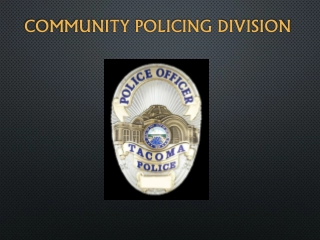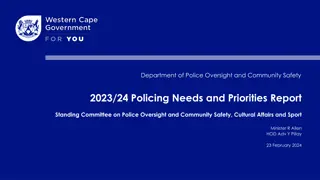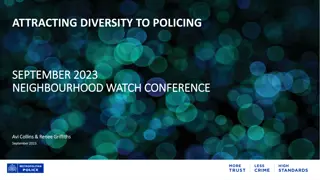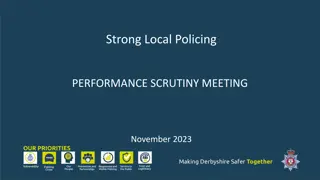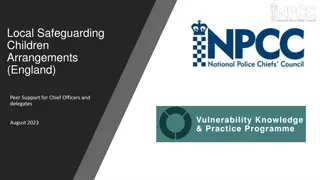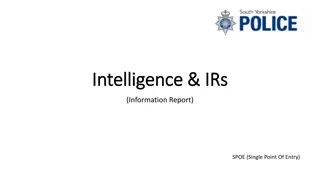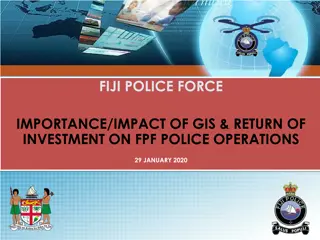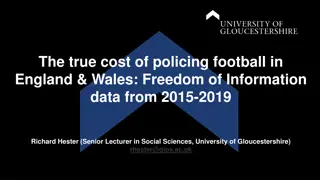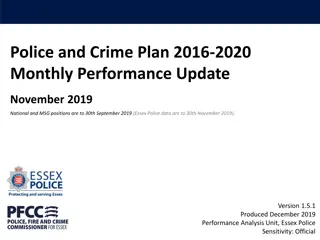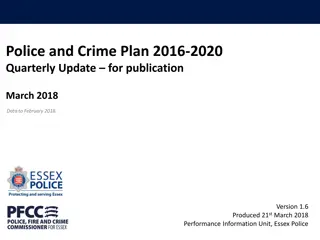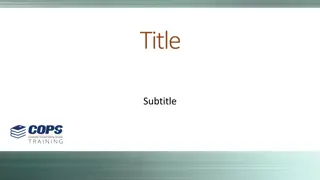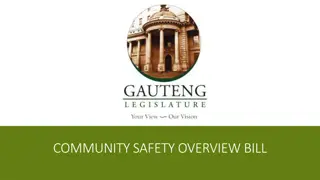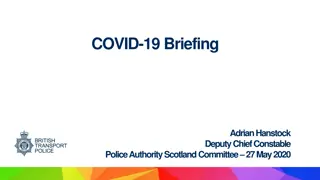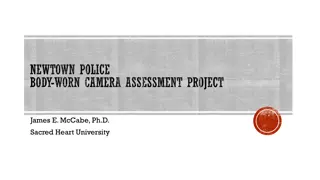Modern Policing Degree Program
Join key stakeholders in a discussion on the AB89 Task Force's findings and recommendations for developing a modern policing degree program in collaboration with the California Community Colleges Chancellor's Office. Explore how local colleges can address these recommendations proactively.
Download Presentation

Please find below an Image/Link to download the presentation.
The content on the website is provided AS IS for your information and personal use only. It may not be sold, licensed, or shared on other websites without obtaining consent from the author.If you encounter any issues during the download, it is possible that the publisher has removed the file from their server.
You are allowed to download the files provided on this website for personal or commercial use, subject to the condition that they are used lawfully. All files are the property of their respective owners.
The content on the website is provided AS IS for your information and personal use only. It may not be sold, licensed, or shared on other websites without obtaining consent from the author.
E N D
Presentation Transcript
Modern Policing Degree Program Cheryl Aschenbach, ASCCC President Jeffrey Lamb, Santa Ana College, Vice President of Academic Affairs Sharon Sampson, Grossmont College, AB 89 Task Force Member Sandra Sanchez, Chancellor s Office, Interim Vice Chancellor
Session Description AB89 (Jones-Sawyer, 2021) required the Chancellor s Office to make recommendations in collaboration with specified stakeholder advisors for a modern policing degree program, and to report those recommendations to the legislature by June 1, 2023. Join presenters for an overview of what the bill required, what the AB89 Task Force learned during its 2022-2023 meetings, and recommendations being made. Presenters and attendees will also engage in dialog about how local colleges are and can be proactive in addressing the recommendations for a modern policing degree in its current degrees, certificates, and POST academy programs.
AB 89 (Jones-Sawyer, 2022) AB 89 Peace Officers: minimum qualifications Bill text This bill requires: The office of the Chancellor of the California Community Colleges (Chancellor s Office) to develop a modern policing degree program, with the commission and other stakeholders to serve as advisors. To submit a report on recommendations to the Legislature outlining a plan to implement the program on or before June 1, 2023. The commission to adopt the recommended criteria within two (2) years of when the Chancellor s Office submits its report to the Legislature. The bill includes (but is not limited to): Recommendations to adopt financial assistance for students of historically underserved and disadvantaged communities with barriers to higher education access, as specified.
AB 89 Task Force: Composition Co-Chaired by ASCCC and POST LEO members: 2 Commission on POST 2 CA Police Chiefs Assn 1 CA Sheriffs Assn 1 Peace Officers Research Assn of CA 1 Institute for Criminal Justice Reform Coordinated by Chancellor s Office w/ consultants RTI International CCC members: 1 CIO, 1 CSSO, 1 CHRO, 3 faculty, 1 students CSU members: 1 admin, 1 faculty
AB 89 Task Force: Purpose, Part 1 The California AB 89 Task Force responsibilities: Provide recommendations on the relationship between a Modern Policing Degree and the current police academy offerings on the Modern Policing degree and the current ADT/Transfer Model Curriculum. Provide recommendations on the competencies and values that should guide the development of a modern policing degree program and bachelor s degree in the discipline of their choosing as minimum education requirements for employment as a peace officer. Identify courses that contribute to officer s critical thinking skills and lowered use of force incidents. Provide recommendations for increasing financial support for increased diversity of students enrolled in modern policing degree program.
AB 89 Task Force: Purpose, Part 2 Provide recommendations and parameters for maximizing credit for prior learning opportunities for prior law enforcement experience, and appropriate work experience, postsecondary education experience, or military experience to satisfy a portion of the employment eligibility requirements. Create a student graduate profile for a modern policing curriculum. Provide recommendations on minimum qualifications for faculty teaching in the Modern Policing Degree program and police academies. Provide recommendations for how faculty teaching in these programs will meet the new Diversity, Equity, Inclusion and Accessibility (DEIA) Evaluation and Tenure Review regulation requirements.
AB 89 Task Force Learning Arc TF1 November 2022 TF2 December 2022 TF3 January 2023 TF4 February 2023 TF5 March 2023 TF6 April 10, 2023 TF7 April 28, 2023 TF8 May 2023 TF9 June 2023 Task Force Overview Current ADT/Transfer Model and Current Police Academy Offerings and their Influence on Changes for the Current Model Framing for Evidence- Based Policing and Contemporary Challenges in US Policing Competencies and Courses Associated with the Development of a Modern Policing Degree Program & Bachelor's Degree DEIA & Instruction in a Modern Policing Degree Program Student Services and Support, incl. Options for Financial Support Continue Development of Task Force Recommendations, Elements of a Modern Policing Degree Program, and Graduate Student Profile In Person Meeting Finalize Task Force Recommendations & Elements of a Modern Policing Degree Program Continue Refining Task Force Recommendations & Elements of a Modern Policing Degree Program Apprenticeship Overview Cont d Apprenticeship Overview, Discussion Faculty MQs; DEIA in Faculty Evals & Tenure Review Review of Current Practices and Academy Training Begin Developing Graduate Student Profile Credit for Prior Learning Cont d Framing for Evidence-Based Policing Continue Graduate Student Profile Graduate Profile Relevance Understanding how Prior Experience Fits within the Profile Strengths and Weaknesses of Current Profile Competencies Needed within Updated Profile Defining Graduate Profile Profiles of Current Graduates Completed Profile DEIA Competency of Profile
Modern Policing Degree Program AB 89 Recommendations: Courses Courses in a Modern Policing Degree (AA or AS in Policing) should include those listed in AB 89: Focus on courses pertinent to law enforcement, which shall include, but not be limited to, psychology, communications, history, ethnic studies, law, and those determined to develop necessary critical thinking skills and emotional intelligence. What other courses or topics should be included? Discuss with someone sitting nearby or in the Zoom chat
Modern Policing Degree Program AB 89 Task Force Recommendations*: Courses The Task Force recommends the following courses and topics, contextualized to the profession where possible, be considered for incorporation into a Modern Policing Degree curriculum as contributing to an officer s critical thinking skills, emotional intelligence, and lowered use of force: Sociology or Social Psychology History of Policing Racial and Cultural Diversity Social Justice Interpersonal and Intercultural Communications Statistics or Intro to Stats for Sociology Policing in the Community (C-ID course) Community and the Justice System Ethical Reasoning/Ethics in Practice Intro to Logic Intro to Crime Intro to Transformational Policing Intro to Critical Thinking Emotional Intelligence Health and Wellness, Mental Health *All recommendations are draft as of June 9, 2023 mtg
Modern Policing Degree Program AB 89 Task Force Recommendations*: Additional Course & Degree Considerations Double count recommended major courses that also satisfy a GE requirement Maximize courses taken as core within associate s degree Prescribe MPDP pathway so GE courses are relevant to degree content and outcomes Maximize flexible learning opportunities for working students by offering courses in a variety of modalities, timeframes, and formats Utilize C-ID processes to develop MPDP model curriculum template and any needed course descriptors to encourage consistency in degree structure and included courses across colleges Design model curriculum template with student financial aid limitations and caps in mind Collaborate at the system level to develop CPL crosswalks from prior academy and career preparation learning to degree courses *All recommendations are draft as of June 9, 2023 mtg
Modern Policing Degree Program AB 89 Task Force Recommendations: Additional Degree Considerations Questions for you to discuss How can academy courses be included while also the long list of additional courses that have been recommended for inclusion? Which academy elements or courses? What about for colleges without an academy?
Modern Policing Degree Program AB 89 Task Force Recommendations: Education MQs for Officers MPDP Associate s Degree is to be foundational to and preparation for employment as a peace officer Design with transferability to a baccalaureate degree Consider a CCC baccalaureate, or collaborate with CSU to explore development of a baccalaureate degree in Policing Question for you: At what point in a peace officer s training, probation, or employment should the MPD be required?
Modern Policing Degree Program AB 89 Task Force Recommendations: Financial Assistance & Student Support Shift the responsibility for navigating financial assistance and student support from students of historically underserved and disadvantaged communities to the institution Intentional outreach, FAFSA support, equipment and supply support Intentional student support, including counseling, tutoring, tech loans, etc. Encourage faculty use of (and development, where needed) of OER and ZTC strategies to reduce or eliminate textbook costs for all courses in the MPDP Identify sources of funding to reduce or eliminate direct costs to students Work with foundations and law enforcement associations to explore non- traditional funding opportunities and incentives What else should be considered?
Modern Policing Degree Program AB 89 Task Force Recommendations: Beyond the Legislation Plan for and fund a longitudinal study of the outcomes of the Modern Policing Degree program on policing, including but not limited to reducing the use of excessive force and increasing community trust. Law enforcement agencies should partner with colleges to create outreach programs to attract students to enroll in and faculty to teach in the Modern Policing Degree program including developing communication plans and recruitment strategies to address recruitment challenges. Colleges should make efforts to advertise the Modern Policing Degree program to historically underserved and disadvantaged communities. Colleges should utilize K-12 pathways for recruitment and communicating about the profession through career explorer programs. *All recommendations are draft as of June 9, 2023 mtg
More Questions for You What are your reactions to the current recommendations? What additional strategies have we overlooked? What else should be kept in mind?
Modern Policing Degree Program AB 89 Task Force Recommendations: Next Steps Chancellor s Office finalizing report and recommendations ASCCC will use C-ID to convene discipline faculty to develop model curriculum and, as needed, course descriptors (Fall 2023) Interested colleges will need to develop a MPDP using MC template and local curriculum processes (Spring 2024-Spring 2025)
Discussion: Local Impacts & Actions to Take For CCC POST academy programs, ensure that total cost of attendance is inclusive of all expenses borne by students to maximize student eligibility for financial aid For existing Administration of Justice, POST academies, and policing programs, explore ways to further support students consistent with MPDP TF recommendations Other?
QUESTIONS? THANK YOU! info@asccc.org AB 89 TF Website
Appendix: Task Force Recommendations As of June 9, 2023
AB 89 Task Force Recommendations*: Courses, Page 1 of 2 Task Force Recommendations re: Courses Courses in a Modern Policing Degree (AA or AS in Policing) should include those listed in AB 89: Focus on courses pertinent to law enforcement, which shall include, but not be limited to, psychology, communications, history, ethnic studies, law, and those determined to develop necessary critical thinking skills and emotional intelligence. In addition, the development of the qualities, competencies, values, and desirable characteristics identified in the AB 89 Task Force s Student Graduate Profile should be incorporated where appropriate into either existing or new courses that are part of the degree. *All recommendations are draft as of June 9, 2023 mtg
Modern Policing Degree Program AB 89 Task Force Recommendations*: Courses, Page 2 of 2 Encourage colleges, whenever feasible, to allow for double counting of core degree requirements for general education coursework to help facilitate completion of the degree. Require colleges offering a Modern Policing Degree to be prescriptive in determining which courses within a general education category are mandatory. Encourage colleges to offer courses asynchronously and in other modalities, scheduling types, and competency-based education approaches where appropriate to the content, activities, and outcomes of a course to maximize flexible learning opportunities for students. Certificates and degree programs should be designed with an awareness of the unit and time limitations or caps on student financial aid. Utilize the existing C-ID (Course Identification Number) process to facilitate development of model curriculum templates and, where courses for the Modern Policing Degree do not already exist, of course descriptors to ensure consistency in AA/AS degrees in Policing. *All recommendations are draft as of June 9, 2023 mtg
Modern Policing Degree Program AB 89 Task Force Recommendations*: Prior Education & CPL Task Force Recommendations Related to Prior Post-Secondary Education Experience and Awarding Credit for Prior Learning Once courses are identified for the Modern Policing Degree and, where needed, course descriptors developed, colleges shall initiate work with discipline faculty, POST, and academy directors to develop credit for prior learning (CPL) crosswalks that provide maximum credit for police academy experience; other law enforcement related academies, including probation/parole, corrections, and dispatch/emergency communications; and career experience. Where appropriate, explore development of credit for prior learning (CPL) crosswalks and awarding of credit for military service and experience in other professions. *All recommendations are draft as of June 9, 2023 mtg
Modern Policing Degree Program AB 89 Task Force Recommendations*: Min. Educational Requirements for Officers Task Force Recommendations Related to Minimum Educational Requirements for Employment as a Peace Officer Colleges currently operating a POST-certified police academy shall adopt the Modern Policing Degree curriculum so that students can complete both an associate degree in Policing and a Police Academy certification. Establish a Modern Policing Degree (AA or AS in Policing) that is foundational to and prepares students for a career as a peace officer, which shall be completed prior to obtaining a POST Basic Certificate. The California Community Colleges should develop the Modern Policing degree with transferability into a baccalaureate degree in mind. The California Community Colleges and the California State University should explore the development of a baccalaureate degree in Policing. *All recommendations are draft as of June 9, 2023 mtg
Modern Policing Degree Program AB 89 Task Force Recommendations*: Financial Assistance, Page 1 of 2 Task Force Recommendations Related to Financial Assistance for Students of Historically Underserved and Disadvantaged Communities Colleges should shift the responsibility for navigating financial assistance from students of historically underserved and disadvantaged communities to the institution and develop Modern Policing Degree programs that are eligible and registered for state and federal financial aid, thereby allowing students to maximize their opportunities for financial assistance. Colleges should provide students from historically underserved and disadvantaged communities with support services, including tutoring and counseling, and information on all other available resources they can access to help ensure their successful completion of the Modern Policing Degree. Colleges should ensure that total cost of attendance for their academy program is inclusive of all expenses borne by students to maximize student eligibility for financial aid. Faculty are encouraged to use Open Educational Resources/Zero Textbook Cost materials, when available, to reduce or eliminate textbooks costs for courses in the Modern Policing Degree program. *All recommendations are draft as of June 9, 2023 mtg
Modern Policing Degree Program AB 89 Task Force Recommendations*: Financial Assistance, Page 2 of 2 Colleges should work with their foundations and law enforcement associations to explore non- traditional funding opportunities, develop scholarships for students participating in the college s police academy, and establish grant programs for low-income students to cover costs of equipment. Colleges should use the California Community Colleges Compendium of Allocations and Resources, which provides comprehensive information about all the funding allocations distributed to districts and colleges, to identify sources of funding that provide opportunities to reduce or eliminate direct costs for students. The Legislature should provide resources and funding to support self-sponsored students especially those from historically underserved and disadvantaged communities with barriers to higher education access who are not eligible for traditional financial assistance. *All recommendations are draft as of June 9, 2023 mtg
Modern Policing Degree Program AB 89 Task Force Recommendations*: Graduate Student Profile, Page 1 of 4 Culturally Competent and Equity-Minded Graduates will exhibit cultural competence, which is the ability to honor and respect the beliefs, language, interpersonal styles and behaviors of those receiving and providing services. Individuals practicing cultural competency have knowledge of the intersectionality of social identities and the multiple acts of oppression that people from different racial, ethnic, and other minoritized groups face. Individuals striving to develop cultural competence recognize that it is a dynamic, on-going process that requires a long-term commitment to learning. In the context of education, cultural competence refers to the ability to successfully teach students who come from cultures other than one s own. It entails developing personal and interpersonal awareness and sensitivities, learning specific bodies of cultural knowledge, and mastering a set of skills for effective cross-cultural teaching.1 Modern Policing Degree graduates will: Understand how one s personal bias or life experiences might impact the action one takes when working with community members, making meaningful decisions, or completing job-related tasks. Support citizens that exhibit mental health disorders at various levels and make judgments that support the care needed for each individual. Demonstrate adaptability and flexibility on the job. Exhibit open-mindedness to non-traditional ideas. Show an awareness of self and of cultures within different communities: language, set of customs, beliefs, and gender identity. Understand the role of police in a democratic society in which all individuals are entitled to equal protection under law, and no individual is above the law regardless of their social, economic, or political station. *All recommendations are draft as of June 9, 2023 mtg
Modern Policing Degree Program AB 89 Task Force Recommendations*: Graduate Student Profile, Page 2 of 4 Critical Thinker Graduates will be critical thinkers who know how to utilize multiple perspectives when making decisions on the job. Modern Policing Degree graduates will: Critically analyze situations and use good judgement under stressful circumstances, even when limited information is available. Independently make appropriate and lawful decisions, especially when it requires them to make unpopular decisions to ensure justice and equitable treatment. Use a logical process to draw conclusions based on different types of inputs, data sets, observations, and patterns Exhibit effective reasoning skills to analyze, evaluate, synthesize, and summarize situations. Understand how to identify and utilize reliable data to solve problems. *All recommendations are draft as of June 9, 2023 mtg
Modern Policing Degree Program AB 89 Task Force Recommendations*: Graduate Student Profile, Page 3 of 4 Resilient Graduates will be able to remain balanced, manage strong or difficult circumstances or emotions, face pressure and challenges and rebound from them, and cope with a crisis using mental and emotional strategies. Modern Policing Degree graduates will: Recognize the need for personal mental health support, including long term health awareness. Exhibit the importance of physical health and create opportunities for health and wellness as a preventive care. Rebound in a healthy way after dealing with stressful situations. Understand how to remain as calm as possible in any situation to create an optimal environment for decision making. Know how to identify trauma and understand how trauma affects oneself as an individual and the community. Utilize resources to support the mental health on oneself and community members. Have the flexibility to incorporate evolving, evidence-based strategies and tactics into their professional activities throughout their career. Have the courage and preparation to support modern policing techniques in the face of institutional or peer resistance within policing agencies. *All recommendations are draft as of June 9, 2023 mtg
Modern Policing Degree Program AB 89 Task Force Recommendations*: Graduate Student Profile, Page 4 of 4 Communicator Graduates will be able to communicate in multiple ways with multiple types of individuals to support their role as a peace officer. Modern Policing Degree graduates will: Apply interpersonal communication skills. Exercise adaptivity and use crisis communication skills when necessitated. Actively listen use listening and comprehension skills to communicate with community members, colleagues, etc. Effectively communicate in written and verbal communications. Collaborate efficiently with colleagues to solve cases. Understand how to de-escalate situations through effective communication with different audiences to prevent the use of force. *All recommendations are draft as of June 9, 2023 mtg


